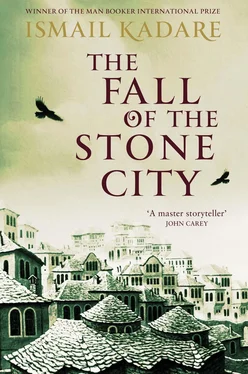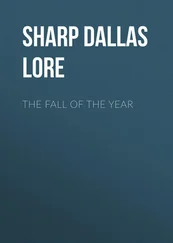He briefly recounted the story. The two wounded colonels met by chance in the field hospital in May 1943. Fritz von Schwabe was seriously wounded, a hopeless case, but Klaus Hempf’s injuries were less severe. The latter expected to be promoted to general as soon as he was discharged from the hospital and sent to a new front. His colleague was waiting only to die.
It was the sort of deathbed friendship that was common in military hospitals. The officers opened their hearts to each other. The dying man grew nostalgic as his strength ebbed and as he left his last wishes. The colonels shared a common interest in the Balkans. Klaus Hempf was to be transferred there after he left hospital. Fritz von Schwabe had dreamed of such a posting because his bosom friend from university, Gurameto, was there. Both had read the popular novels of Karl May, which extolled the local customs, especially those of the Albanians: hospitality, the word of honour, the Kanun of Lekë Dukagjini . Gurameto had often talked about these things.
Clearly Fritz would not be going anywhere and least of all to Albania as he had promised his friend. So he asked his fellow-officer to carry out his dying wish, if destiny led him there: to seek out his friend and bid him farewell. He gave his address: Dr Gurameto, 22 Varosh Street, Gjirokastër.
Klaus promised. It was 11 May 1943. Fritz died, practically in his arms.
Klaus might have forgotten his vow if he had not by chance been in command of the tank regiment entering Albania four months later on 16 September 1943. The name of the city reminded him of his promise. He found the address in his notebook. And so the events as we know them unfolded: his meeting with Dr Gurameto, the sudden whim to present himself as his friend, the invitation and the dinner.
“This sounds like a romantic movie, no?” asked the Russian investigator. “Or a fairy tale. That’s what you kept shouting during the interrogation, didn’t you? ‘What is this fairy tale? What does it mean? Speak!’”
They nodded that this was true.
“But you see, it’s no fairy tale. Dr Gurameto is not lying. All this actually happened. This is not speculation or rumour. Our files prove everything.”
The Russian investigator now produced from the file some photographs of written pages, extracts from Klaus Hempf’s diary. “Does this dinner strike you as mysterious? There is no mystery at all. Here is a record of the conversation, written the next morning with exemplary accuracy.”
He also handed over four typed pages.
“You look as if you’ve seen a ghost. Now take a look at the rubber stamp at the top of each page.”
There was the Nazi emblem with the word “Gestapo”. Their skin crept more than at the sight of any ghost.
“Didn’t it ever occur to you that one of the colonel’s aides at the famous dinner would be a Gestapo man? Here are his notes, which we found in the Gestapo archive. You see, we know everything.”
The Russian laughed.
“You may ask, so this hero of a colonel was being watched? Of course he was. At that time everybody was suspected of something. You didn’t become a suspect; you were one already. But now after the good news here comes the bad. In some cases we don’t know everything, and this is one of them.”
He sipped the last of his coffee.
“There is one vital element we don’t know, and that is why Colonel Klaus Hempf, there on the city square, did not tell Dr Gurameto that he brought a message from his college friend, but said that he himself was Fritz von Schwabe.”
For a moment he pinned the two Albanians in his stare.
“Was it a whim? Of course it was. Hempf’s personal file describes him as an impulsive, even unreliable character. It’s a characteristic of these headstrong, reckless types. But we don’t know the real reason behind this caprice. The riddle remains unsolved and this mystery lies behind the dinner. How can we find out this secret?”
He requested a second cup of coffee and continued as the others listened in silence.
“The authors of this conundrum now lie dead and buried.”
The Albanian investigators listened in bewilderment.
“They took the truth to their graves,” the Russian added. “But before we ask how we can dig up this truth, we must ask ourselves if we need it. Dr Gurameto talked about the German strategy for this country, secret agreements and the like. At the time these things were important but now they are merely the politics of a bygone era. Albania is now a communist country. This story is finished. But let me say again, there is a mystery behind this dinner. From the moment that the German colonel introduces himself as a visitor from the next world, we are in the dark. Now, listen carefully to me.”
The atmosphere was heavy on that night of 27 February 1953. Shaqo Mezini could not sleep. Lightning was bad for sleep, he had heard. He stood up several times and went to the window, watching the jagged forks above the prison. He had not seen such lightning for a long time. It was called false lightning, he remembered. His thoughts whirred compulsively. What if the wire of the lightning conductor breaks? He imagined the lightning carried into the depths of the prison, down to the Cave of Sanisha, and Gurameto burned to a cinder.
It was almost midnight. He seized his winter coat that lay thrown across the chair, silently descended the stairs and went out into the street.
The staff car of the Interior Ministry was waiting at the end of the alley, with Arian Ciu inside. They muttered a greeting to each other. “What a night!” said his colleague. The car climbed the street with difficulty.
“Dr Gurameto, we have thought a lot about your case.”
“What?” said Arian Ciu in a tired voice.
“Nothing. Was I talking to myself?”
“That’s what it seemed to me.”
Shaqo Mezini had thought about what he would say. “Dr Gurameto, we believe that you have been honest with us in this investigation. You have ideals. We’re cut from the same cloth as yourself. We have ideals, but different ones to yours. Fortunately we agree on one thing and that is the importance of the nation. You’re convinced that you’re helping the nation in what you do. We think the same. Both sides can’t be right. It’s you or us, Dr Gurameto. Let’s find out which it will be.’
The engine noise changed and they noticed they had entered the castle. The scattered lights barely illuminated the arched vaults. Shaqo Mezini turned over in his mind the same thoughts that had preoccupied him for the last thirty hours.
“We could take the shortest route and convict you on the spot. Collaboration with the occupier. The people are shedding blood on the battlefield against the enemy while you host dinners with music and champagne. That would be sufficient for a bullet in the neck in any country, even France or England.
“We could take it further. Let’s go back to the dinner; what was it for? To celebrate treason and toast the German invasion? How shocking. But it could be still worse. Something else might be behind it. Some horror manifesting itself at your dinner. Something that would appal even the Germans. Something monstrous that is bigger than any of us.”
Shouts of “Halt!” came from the guards, then the prison’s outer gates creaked. A soldier holding an oil lamp lit up the investigators’ faces. Then the car proceeded across the deserted courtyard.
“What were we talking about? Your sentence. Hundreds of people heard the music coming from your dinner. The most obvious thing would be to shoot you and intern your wife and daughter. Your story would end on a sandbank by the river. But we have another idea. We have faith in your vein of idealism and we think that you can do something for the nation. The evening before last, you talked to us about the pro-German elite, which included Mehdi Frashëri, Father Anton Harapi, Eqrem Çabej, Lasgush Poradeci, Mustafa Kruja and, if I recollect rightly, Ernest Koliqi. Even though they all made or were about to make the wrong choice, their purpose was, as you said, to serve an ideal. They sacrificed all they had, their reputation, their honour, in a mistaken cause. One sacrificed his Franciscan habit and another his own talent. But they were thinking of the nation. Big Dr Gurameto, that is all we are asking of you. Do what they did.”
Читать дальше












